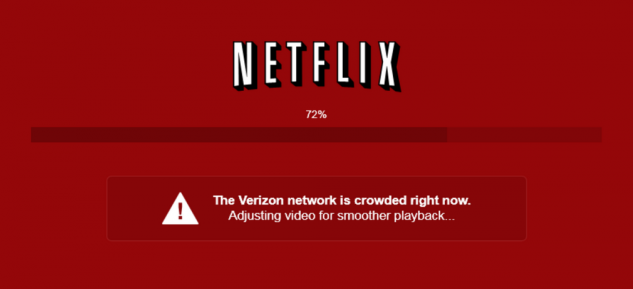
Netflix sure knows how to get a rise out of Internet service providers: Since mid-May, the streaming video service has been posting an error notice to Verizon subscribers blaming the network for slow delivery of its online videos. Verizon issued a cease-and-desist order and demanded lists of Netflix customers who might have seen this message.
The streaming provider’s response? Don’t blame us for your crappy network.
The letter from Netflix General Counsel David Hyman (.PDF) starts out cordially enough:
Your interpretation mischaracterizes our messaging. The message you cite to in your letter merely lets our consumers know that the Verizon network is crowded.… The message is part of our ongoing transparency efforts.
Basically, Netflix said that the error message was merely part of a transparency test, which is set to end June 16. Whether that was always the plan or merely a last-minute decision to (somewhat) appease the ISP isn’t clear, though it’s very likely the latter.
Still, Netflix couldn’t resist throwing in a few barbs:
In fact, it is my understanding that Verizon actually upsells customers to higher speed packages based on improved access to video services, including Netflix…. To ensure that these customers get the level of service they pay you for, it is your responsibility to make sure your network, including your interconnection points, have sufficient capacity to accommodate the data requests made by those customers.
Translation: You’re charging people for service you aren’t providing, and somehow calling Netflix on that? That’s just not cool.
Then things took a turn for the hilarious.
To try to shift blame to us for performance issues arising from interconnection congestion is like blaming drivers on a bridge for traffic jams when you’re the one who decided to leave three lanes closed during rush hour.
In addition, the streaming company criticized Verizon’s refusal to join Open Connect, the peering and caching program Netflix established to allow ISPs to connect right to the service directly instead of going through third-party content delivery networks. Participants include Frontier, British Telecom, TDC, Clearwire, Telus, Bell Canada, Virgin, Cablevision, Google Fiber and others. Notably Verizon and Comcast are both missing from the list.
You have chosen not to participate in the Open Connect Program, but instead have allowed your network connection to Netflix to degrade until we agreed to pay for augmented interconnection. We brought the data right to your doorstep…all you had to do was open your door.
Meanwhile, Netflix flatly ignored Verizon’s demand for the subscriber list. No word yet on the broadband provider’s next course of action, but we’re getting the popcorn ready for the next act in this little play. Because it’s quite likely that Verizon’s rebuttal will be swift and fierce. Unfortunately, as the drama continues on, viewers are the ones who are losing.

















